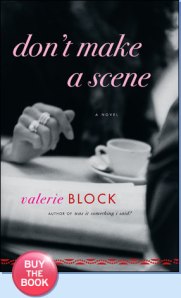 Cari and I met online when we were both dreaming of the day we’d sell our first books. She was one of my first fans and has been actively promoting chica lit and chick lit through the Chick Lit chapter of Romance Writers of America. But now, she’s stepped out from behind the scenes to become a rising star in young adult fiction.
Cari and I met online when we were both dreaming of the day we’d sell our first books. She was one of my first fans and has been actively promoting chica lit and chick lit through the Chick Lit chapter of Romance Writers of America. But now, she’s stepped out from behind the scenes to become a rising star in young adult fiction.
Her debut, Adios To My Old Life placed second in the Florida Writers Association’s Royal Palm Literary Award, was named by Latinidad as the Top Teen Read of 2006 and received the Rita for Best Contemporary Single Title Romance, the most prestigious award given by Romance Writers of America.
Today, Cari is releasing her second young adult novel, It’s Not About The Accent. She sat down to share her story of publication and how music has played a role in all of her books.
Chica Lit: It’s Not About The Accent is about Caroline who transforms herself into Carolina during her first year in college. Where did the story and Caroline come from?
Cari: It came primarily from the basic premise of how at some point or another, we all want to be someone or something else than what we are. Growing up, I remember a lot of Latina girls wanting to be more Anglo in their appearance with hair color and dress and tinted contact lenses. What I thought would be fun for this story would be to take a girl that on the surface is as white bread as they come (by her own reckoning) and have her try on the persona of a Cuban girl. It’s not entirely a random choice either— her great-grandmother, whom she adored, was Cuban although that was a fact my character didn’t find out until after her Nana’s death. But for her, it was like pieces of a puzzle falling into place— her great-grandmother had been the one person in the family who had had these exciting adventures and had traveled many places and she was the only one who hadn’t been born and bred in this small, Ohio town.
Chica Lit: Tell us about your journey to becoming a published (and award-winning!) author?
Cari: I wrote. And wrote. And wrote some more. Seriously, though, I’ve been writing my entire life, but seriously with an eye toward publication for about the last six years. My original focus was women’s fiction, which I still write and it was one of those manuscripts that captured an agent’s attention. While she was shopping that manuscript to editors, she heard that another editor was looking for Latina-themed young adult novels and did I have an idea? I was a little thrown initially, since I’d never considered YA— I honestly didn’t think I’d have a good voice/tone for the genre. But I gave it a go and well… here I am.
Chica Lit: If you could back to the time before you published your first book, what would you tell yourself?
Cari: Don’t ever assume ANYTHING. I know that publishing is a freaky, unpredictable industry, but if you had told me that my first published novel was going to be young adult and that it would win awards not only for young adult books, but take a RITA in an adult category and that nearly two years after selling my first young adult novel, I’d still be waiting on that first elusive sale for one of my women’s fiction novels, especially considering how close I’ve come a few times with those manuscripts? Well… let’s just say I’d be asking what you smoked.
Chica Lit: What turns you on creatively?
Cari: Oh, music. Without a doubt. A musical passage or a lyric can inspire whole scenes, if not entire storylines, in a flash. There’s nothing that brings me peace, fires me up, stirs the deepest core of my emotions as music— any kind of music.
Chica Lit: What turns you off?
Cari: A lack of respect for the creative process, especially when it comes from other writers, who are the first ones who should respect that the process is different for everyone. Actually, just a lack of respect in general— all of us who do this gig have first hand knowledge of how hard it is, both creatively and from a business standpoint. The last thing we need to be doing is tearing each other or what we write down.
Chica Lit: Best piece of advice ever given to you?
Cari: The classic, BICHOK- Butt in Chair, Hands on Keyboard. You can’t write a book without actually, you know, writing.
Chica Lit: What’s next?
Cari: I’m currently working on a modern retelling of the story of Carmen, from Bizet’s opera. My Carmen is a dancer, and rather than an army officer and bullfighter, she finds herself between an intense, disciplined music prodigy and a flamboyant, let it all hang out, soccer player. It’s been a lot of fun writing this so far, since the overall setting is the world of competitive drum and bugle corps (it all makes sense, I SWEAR). Anyhow, drum corps was an activity that formed a huge part of my adolescence and it’s been a blast being able to revisit some of the best times of my life while writing this story. Right now, the working title is, “A Thin Line” and it’s scheduled for a Spring 09 release from Dial.
After you run out and get Cari’s new book, It’s Not About The Accent (so she’ll become a best seller and buy me a drink at next year’s RWA Conference!), here’s the soundtrack she created for the story!









 Cari and I met online when we were both dreaming of the day we’d sell our first books. She was one of my first fans and has been actively promoting chica lit and chick lit through the Chick Lit chapter of Romance Writers of America. But now, she’s stepped out from behind the scenes to become a rising star in young adult fiction.
Cari and I met online when we were both dreaming of the day we’d sell our first books. She was one of my first fans and has been actively promoting chica lit and chick lit through the Chick Lit chapter of Romance Writers of America. But now, she’s stepped out from behind the scenes to become a rising star in young adult fiction.
